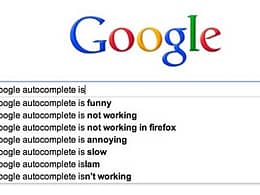
What is Google Algorithm?
In order to understand what a Google Algorithm is, lets first look at what algorithms in general are.
The Standard Definition is : a set of rules for solving a problem in a finite number of steps.
In the language of computer an algorithm sets the stage for the computer to perform a very specific task. For instance, the computer may be programmed to randomly came up with a number between 1 and 100. This is a task that has a set beginning point and end point.
How Google Algorithm work ?
Basically when we ask How Google’s Algorithm Rules the web First of all we have to understand How does the Google’s algorithm work.
The Google’s algorithm does the work for you by searching out web pages that contain the keywords you used to search, then assigning a rank to each page based several factors, including how many times the keywords appear on the page
Types of Google Algorithm
Google has introduce five main algorithm updates, named, panda, penguin, Hummingbird, Pigeon, and Fred. The entire list of all the google updates can be found here at Moz
How Google’s Algorithm Rules the Web
Google has a very complex Algorithm for serving search results, and it changes relatively frequently and Although the Company does not make the exact Algorithm Public, here are a few elements page’s ability to appear in the results for certain keywords.
- The Keyword’s appearance in the page’s title, header tags, and meta description.
- The amount of naturally occurring organic links to the page.
- The way the website performs on mobile devices, such as smart phones and tablets.
How does Google determine which elements matter the most ?
The calculations by the Google platform are conducted incredibly quickly and the ranking may fluctuate as web developers manipulate the attributes that contribute to page ranking across a website, or on a single page. Therefore ranking as assigned by the Google Algorithm are build. A page that ranks third for a keyword may rise to first or fall to tenth as the content on both it and the other page in the results change usually, the top spots are held by business that to search engine optimization or SEO, on their sites.
Understanding the Google Algorithms
Indexing
When you have a large amount of content you need a way to shortcut to that content. Google can’t just have one big database containing all the Pages, which they sort through every time aquery is entered. It would be way too slow. Instead, they create an Index which essentially shortcuts this process. Search engines use technology such as Hodoop to manage and query large amount of data very quickly. Searching the index is for quicker than searching the entire database each time. Common words such as Hadoop to manage and query large amounts of data very quickly. Searching the index is for quicker than searching the entire database each time.
Common words such as ‘and’ ‘the’ , ‘If’ are not stored. These are known as stop words. They don’t generally add to the search engine’s interpretation of the content so they are removed to save space. It might be a very small amount of space per page. But when dealing with billions of pages it becomes an important consideration. This kind of thinking is worth bearing in mind when trying to understand Google and the decisions it maker. A small per page change can be very different at scale.
Ranking Algorithms
The content has now been indexed. So Google has taken a copy of it and place a shortcut to the page in the index. Great, it can now be found and displayed when matching a relevant search query. Each search you make in Google will likely have 1000’s of result, so now Google needs to decide what order it’s going to display the result in. This is really at the heart of SEO adjusting factors to manipulate the order of results Google decides which query goes where through the Algorithm. An Algorithm is a generic term which means a process or rules set that’s follows in order to solve a problem. In reference to Google, this is the set of weighted metrics which determines the order in which they rank the page .
Understanding the Google Algorithm
The Google Algorithm is not the mystery it once was and the individual factors and metrics which it is made up of are fairly well documented. We know what all the major on-page and off-page metrics are. The tricky bit is in understanding the weighting or correlation between them. If you searched for ‘chocolate cake recipes’ the Algorithm will then weight the pages against that search term.
Let’s take a simplified look at two metrics and how they might influence each other. Metric is the URL. The keywords might appear in the URL, such as : www.recipes.com chocolate cake. Google can see the keywords ‘chocolate cake’ an ‘recipes’ in the URL so it can apply a weighting accordingly.
Now on to metric 2, the back links for the page. Lots of these might have the keywords ‘chocolate cake’ and ‘recipes’ in them. However Google would then down- weight this metric because if the keywords appear in the URL you would expect them to appear in the bank links, relevant or not. Conversely , Google might choose to apply more weight to metric 2 if the keywords did not appear anywhere in the URL. All the different factors Google looks at affect each other. Each one may be worth more or less and the relationship and weighting that’s changed more than the metric themselves. When this does happen it is usually in a more major update, such as penguin or panda The different metrics can be broken down into four key sections.
Relevance
How relevant is the content to the query the indexer is the first test on this determining if it should appear in the results at all. However, this is taken a step further in order to rank the keywords. It make sense that when searching for something you want to see the most relevant results possible.
Relevance is determined by a mix of on-page and off-page factors. Both of these focus on the placement of keywords, such as in page titles and anchor text some metrics are a combination of these. For example. If the domain as a whole is seen to be relevant to the search term, this is going to boost the relevancy score of the individual page being scored. If you want to find out a more about this recommend reading my article ‘ How search engines use keywords.
Authority has its roots in pagebank, invented by larry Page it’s the backbone of how Google ranks content. Understanding page rank is part of the key to understanding how Google works. But it’s worth remembering that there are . hundreds of additional factors which can also effect ranking and page bank is less important than it was in the past. Page Rank is often explained in terms of votes. Each link to a page is a voter the more votes it has the better it should rank. If a page with a lot of votes links to another pages then some of that voting power is also passed on. So even if a page which has a lot of votes, it may still rank well and pages it links to will also benefit from that. The value passed from page to page via links is known as link juice or page juice. Relevance is also important in the context of authority. A link with relevant anchor text may pass on more weight than a link which is not from a relevant site and does not have relevant anchor text, and which Google is more likely to disregard in the context of that search reult.
Trust
This is an anti-spam algorithm, focused on making in harder to artificially manipulate the search results. Google has a love-hate relationship with SEO is about creating great content and user experience. On the other. It’s also about trying to artificially manipulate what Google has determined as the natural order of the results. Trust metrics are very hard to manipulate and they give Google greater confidence in the other metrics. Things like the age of the content or the domain are trust metric. If you have lots of links from ‘bad neighbourhoods these links are not only going to bo worthless but will also make Google think twice about ranking your sites for the ‘chocolate cake recipe’ search in the same way if the page or domain links out to bad neighbourhoods it’s going to damage those trust metrics. Google is actually a domain registrar, meaning they can see all the whole data for different domains. This allows them to incorporate information, such as how, often a domain has changed hands on how long until the registration expire, into those trust metrics. These are much more difficult to manipulate. Trust is also determined by the type of domain or page and what type links to you. With the opposite effect to a bad neighbourhood academic sites such as.edu domain carry high trust.
Google wants the content it displays in its search results to be attractive to humans as well as search engine robots. There is a set of metrics which is dedicated just to be these factors. Having great content but then. For instance covering it in ads is not going to make for a great user experience.
This is why Google will down weight a page when the ads placement is overly prominent.













